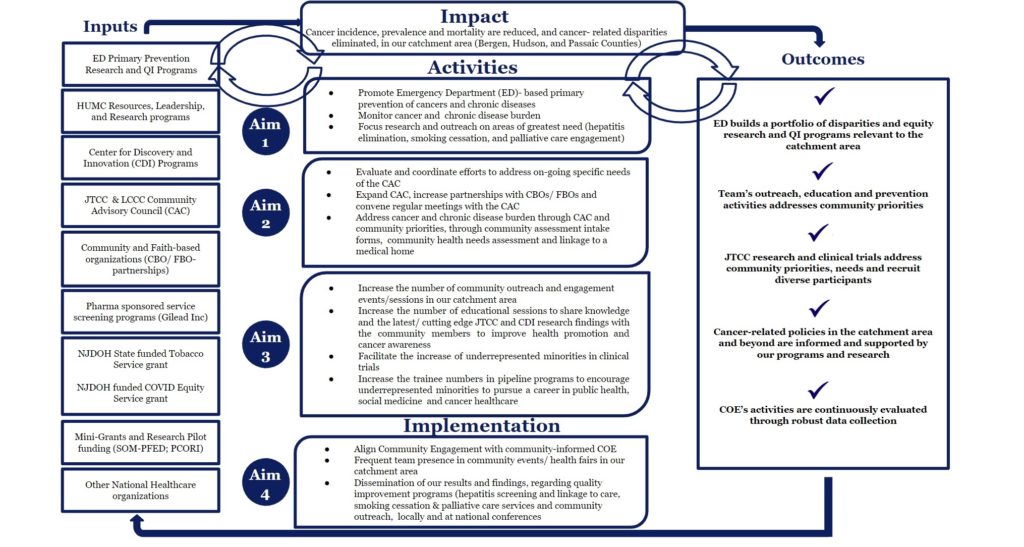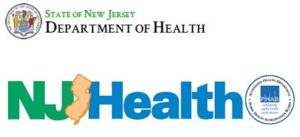Research in the Ogedegbe Lab

Logic Model- Programs Details
- Frontlines of Communities in the United States (FOCUS) Partners – by Gilead Sciences
Hackensack Meridian Health has become the most extensive inpatient and outpatient services provider in New Jersey (NJ). Hackensack University Medical Center (HUMC) and Palisades Medical Center (PMC), located in Bergen and Hudson Counties, are health care hubs for the Northern New Jersey and New York metropolitan areas. In the counties our health system serves and its neighboring counties, the HIV, HCV, and HBV disease burden continues to be the highest in the State.The FOCUS Program is a public health initiative that aims to decrease the stigma underlying blood-borne viral testing, integrate these screenings (HIV, HBV, and HCV) with routine medical care and ensure linkage to care, in alignment with the Centers for Disease Control (CDC), the U.S. Preventive Services Task Force (USPSTF), State and Local Health Department guidelines.With this initiative, we have:- Implemented routine HCV and HBV screening and linkage to care at HUMC and PMC’s EDs
- HUMC and PMC EMR systems were modified to include HCV and HBV routine screening and linkage to care by using a Universal screening algorithm and EPIC (EMR) logic
- Implemented a real-time FYI EMR alert for the patient navigator to follow up with positive patients who are lost to follow up
- Linked over 70% of positive Hepatitis B patients and over 50% of positive Hepatitis C patients in both hospitals
- The team educates healthcare staff on routine screening and linkage to care (LTC) during the walking rounds, huddles, 1:1 meetings, resident physicians, faculty conferences, and email communication
- Disseminated information locally, regionally, and nationally on routine screening and LTC
Ultimately, with screening and appropriate linkage to care for HIV, HCV, and HBV infections, our health system would lead in helping our community towards the Department of Health and Human Services (DHHS) and World Health Organization (WHO) goals to improve diagnosis. Another area of concern in the catchment area served is the impact of the opioid epidemic on HIV, HCV, and HBV disease burden. Hudson and Essex Counties, one of the neighboring counties, are part of a national initiative called Ending the HIV Epidemic: A Plan for America (EHE) that aims to reduce new HIV transmissions by 75% by 2025 and by 90% by 2030.
- HMH Tobacco Quit Center- by NJDOH


The HMH Tobacco Quit Center is a smoking cessation program sponsored by the New Jersey Department of Health. This program partners with community-based organizations in Hudson and Passaic Counties, referring smokers to us to receive treatment, counseling sessions, and pharmacotherapy. The treatment is delivered through in-person meetings, telemedicine, and text-message. Dr. Chinwe Ogedegbe oversees this hospital-based program in bedside counseling, managing pharmacotherapy and implementing an electronic referral system within various Hackensack Meridian Health clinical departments, including surgery, trauma, psychiatry, dental, med-surg floors, and the emergency department.This program offers:- Tailored Counseling available in English and Spanish
- Available in Bergen, Hudson, and Passaic Counties
- Nicotine Replacement Therapy, NRT (Free for uninsured clients)
- Text messaging support
- Individualized Treatment Plan
- Treatment for Vaping
The treatment plan consists of:
- Establishing rapport to create their unique quit plan.
- Identifying client motivators for quitting smoking and methods of increasing confidence for success
- Increasing understanding by clients of best methods for using NRT medications and text messages.
- Reinforce quit strategies, encourage abstinence, and address concerns and barriers with a focus on success
- Link clients who need a medical home to a PCP through HMH Clinics
Emergency Department Research and Service Grant Programs
- COVID-19 Health Equity ED (CEED) Program
Through this program sponsored by the NJ-DOH, we will expand and integrate our electronic medical record (EMR) infrastructure to support COVID-19 prevention and control among underserved patients with COVID-rsk factors, Chronic Diseases, Behavioral Illness or Tobacco Use Disorder. Strong relationships are being made with Providers, Community-Based Organizations, Health Departments, Mental Health and Substance Abuse Clinics, Pharmacies, Primary Care Providers, Schools, Faith-Based Organizations, and Advocacy organizations to create collaborations that address social and healthcare challenges. (This includes: referral to tobacco cessation services, substance abuse centers, mental health providers, linkage to Primary Care Providers or a medical home). - EMPallA – PCORI funded
Emergency Medicine Palliative Care Access (EMPallA) is a two-arm, multisite RCT of 1350 older adults (50+ years). This study aims to compare nurse-led telephonic case management to specialty outpatient palliative care for older adults with serious, life-limiting illness, discharged from the Emergency Department. Variables being compared within this study include: quality of life for the patients, healthcare utilization, loneliness and symptom burden, caregiver strain, caregiver quality of life, and bereavement. - P-FED – HM – School of Medicine funded
A Pilot RCT study funded by the Hackensack School of Medicine. The study takes place in both Hackensack University Medical Center and Palisades University Medical Center, one is randomized to the performance feedback intervention and the other to be given standard education.. The primary objective of this study is to adapt and evaluate the effect of nurse-focused performance feedback (PF), on identification, screening, and referral of smokers in the ED to the Tobacco Quit Center within the Hackensack Meridian Health Network (HMHN). The study takes place in both Hackensack University Medical Center and Palisades Medical Center. - Pipeline Program: HUMC- NARAP (RA) Volunteer Program; A Program of the Emergency Medicine Department
The Research Associate (RA) program at Hackensack University Medical Center is part of a nationwide organization known as the National Alliance of Research Associates Program (NARAP). NARAP is a consortium of academic medical centers and community hospitals that collaborate to conduct clinical research studies in hospital emergency departments. Research Associates have the ability to engage with patients, participate in most parts of the research process, present abstracts or posters at academic conferences, participate in unique team research, and become exposed to healthcare providers that are experts in their field. Research experience is invaluable for those applying to professional schools, as well as gaining exposure to the scientific processes in clinical and pre-clinical research; the Emergency Medicine Research Associates Program allows pre-health students this unique opportunity. The typical RA is a college student interested in healthcare. - Pipeline Program: Careers in Medical Sciences (CIMS Program); Volunteer Shadowing program; A Program of the Emergency Medicine Department
This program is designed for college students who are interested in pursuing a medical career as physicians, physician assistants or nurse practitioners. Its primary objective is to provide the student with exposure to the reality of medicine in an onsite teaching hospital setting. This program allows participants to shadow Emergency Medicine providers; it is a unique way for the student to understand the clinical environment, the responsibilities and challenges of practicing medicine in the Emergency Department. Ultimately allows students to be able to make informed decisions of whether or not to pursue a Career in Medicine. - Community Advisory Council (CAC)
The Community Advisory Council (CAC) is a volunteer group formed by 16+ community leaders representing educational, research, government, media, community, and faith-based organizations. Together, they identify and address cancer-related disparities in Northern New Jersey. The council’s mission is to evaluate and improve cancer care quality, accessibility, and affordability to underserved communities.Its vision is to provide a transformational approach in delivering cancer care that will serve the underserved community by bridging resources, education, and awareness while collaborating with community leaders.The council convenes quarterly to:- Create and review policies and procedures to provide a high standard of cancer care, accessibility, and affordability
- Identify and address cancer care disparities relevant to the community
- Assess cancer care needs and resources to evaluate the community’s needs
- Evaluate and address ongoing issues to coordinate efforts to address a specific need
- Focus Groups
Addressing cancer-related risk behaviors, protective factors, and healthcare access among underserved communities in Northern New Jersey. We explore via focus groups how cancer-related risk behaviors, protective factors, and access to healthcare vary among underserved communities in Northern New Jersey. Our goal is to understand the knowledge, attitudes, subjective norms, self-efficacy, and beliefs regarding cancer-related risk and protective factors and access to healthcare in these communities in Bergen, Essex, Hudson, and Passaic Counties.We conduct sessions of 8-13 participants where the participants will be given a platform to share their cancer-related concerns and priorities and contribute to developing future programs and activities. - Community Grand Rounds
The Community Grand Rounds are educational sessions to share the knowledge and latest research findings to improve health promotion and cancer awareness in Northern New Jersey. Each session includes networking opportunities, formal presentations, and audience Q&A sessions. This proven format allows us to talk with community members about topics that can improve the health and wellness of their communities.
Recent publications
Cartujano-Barrera F, Arana-Chicas E, Catley D, Cox LS, Diaz FJ, Ellerbeck EF, Graves KD, Ogedegbe C, Cupertino AP. Decídetexto: Mobile cessation support for Latino smokers. Study protocol for a randomized clinical trial. Contemp Clin Trials. 2020 Dec;99:106188. DOI: 10.1016/j.cct.2020.106188. Epub 2020 Oct 17. PMID: 33080379; PMCID: PMC8315307.
Arana-Chicas E, Cartujano-Barrera F, Ogedegbe C, Ellerbeck EF, Cox LS, Graves KD, Diaz FJ, Catley D, Cupertino AP. Feasibility and Effectiveness of Recruiting Latinos in Decídetexto-A Smoking Cessation Clinical Trial from an Emergency Department Patient Registry. Int J Environ Res Public Health. 2021 Oct 15;18(20):10859. DOI: 10.3390/ijerph182010859. PMID: 34682601; PMCID: PMC8535914.
Abar B, Ogedegbe C, Delaware P, Freeman K, Boudreaux ED, Illuzzi F, Carro-Kowalcyk S, Molloy M, Bradley K. Promoting tobacco cessation utilizing pre-health professional students as research associates in the emergency department. Addict Behav. 2015 Jan;40:73-6. DOI: 10.1016/j.addbeh.2014.08.014. Epub 2014 Sep 6. PMID: 25226592; PMCID: PMC5120677.
